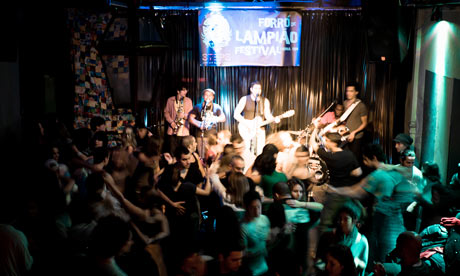
Outside Lisbon's Steps club and dance school platefuls of feijao tropeiro – a traditional Brazilian dish made from beans, cassava flour and chorizo sausage – are being served. People stand about enjoying the smells and sounds of the Forró de Lampião Carnival. Inside the club the music flows breathlessly from one song to the next. The accordionist and the drummer veer off on wild creative tangents, while the triangle player, a keystone in forró music and dance, holds everything together.
As a long-time enthusiast of forró music, I was drawn to the carnival by the prospect of finally seeing it live, and Lisbon is a great place to do that. Not only does the city have a thriving community of Brazilians, it's also home to the Projecto Forró de Lampião which aims to promote forró culture through year-round workshops and events – with the carnival its most vibrant celebration. Now in its second year, the carnival brings together more than 300 people from around the world - from experts in forró dance to first-timers like me.
The live performances are at the Steps club near Santa Apolónia station, a short walk from the centre of Lisbon. Positioned on the banks of the Tagus river, Steps oozes modern chic with its big leather seats and private booth tables. Upstairs there's a huge dance floor with mirrored walls and a stage for the forró bands.
Perhaps most importantly the club respects "Brazil time", with the bands starting late and playing until the last couple call it a night, usually at 5am or 6am. On stage when I arrive are the energetic O Bando de Ujuara, a forró-fusion group led by drummer and DJ Enrique Matos. The name forró, he tells me afterwards, came about as an adaptation of the English words "for all", and represents a welcoming attitude that remains today.
In this musical mix are European guitar styles, African poetry traditions and Enrique's own instrument of choice, Brazil's home-grown zabumba drum. The defining sound of forró is in the accordion, an instrument favoured the world over by travellers and street musicians. Enrique has a grinning tattoo of the legendary Luiz Gonzaga on his right arm, accordion strap over shoulder and leather cangaceiro hat on his head, in direct homage to the anti-feudal folk hero Lampião.
The next morning I head for Praça Luis de Camões for a percussion workshop. A sure winner for suppressed noise lovers, this is a rare opportunity to be as loud as possible for an hour without being told to shut up. Locals watch from cafes and nod along approvingly. Drums and triangles are supplied by Projecto Forró and direction is given by Higo Rafael, the trianguleiro and lead singer for popular forró group Trio Mafua. Both percussion and dance workshops are included in a carnival ticket if you arrive at the scheduled time, with attendance for each at around 40 people.
Dance workshops take place at the Casa do Brazil. Sitting amid the colourful shutters of the trendy Bairro Alto quarter, the Casa is an important cultural hub for Brazilians in Lisbon. Framed photos on the walls show visits from various Brazilian prime ministers. It's easy to learn the basics of the dance – left foot forward, left back, right foot back (base um), turn, right forward (base dois). Yet, as dance teacher Pablo Dias explains with heavy gesticulation, these two moves spawn endless possibilities from the ankle up. The pace is set by the musicians, or by Pablo's iPod in this case – he skips until a song fits the general feel of the group – and the dancers build their base um and base dois on the third beats.
The result is a room full of twirling couples, each with their own unspoken interpretation of the music. Each workshop ends with a ripple of applause and a final cheer of Brazilian pride – not just from nationals, but from the many others who have adopted the spirit of forró culture. Forró, for all: it's an attractive lifestyle, and Lisbon's Forró de Lampião Carnival makes for a perfect first immersion.
Where to stay
Lisbon Old Town Hostel in Bairro Alto (lisbonoldtownhostel.com) has dorm beds (€16) and twin bedrooms (€50) and is a five-minute walk from the Casa do Brazil. The owners are regulars at the forró workshops.
How to do it
Easyjet fly from London Gatwick to Lisbon from £32.99 one way.
Lisbon's Forró de Lampião Carnival runs from 17 to 21 February. Tickets cost €5. Information on forró in Lisbon and the carnival is available at Projecto Forró de Lampião.

